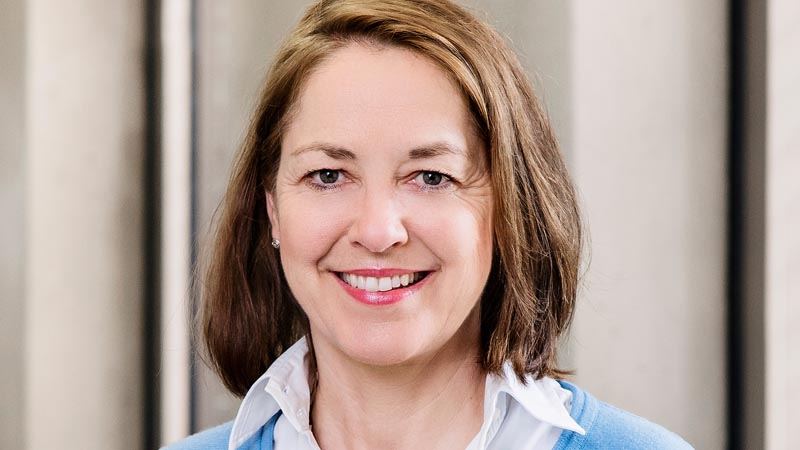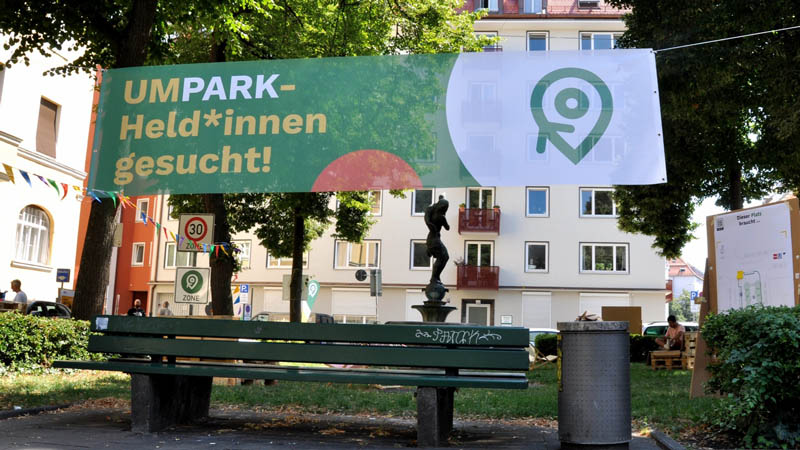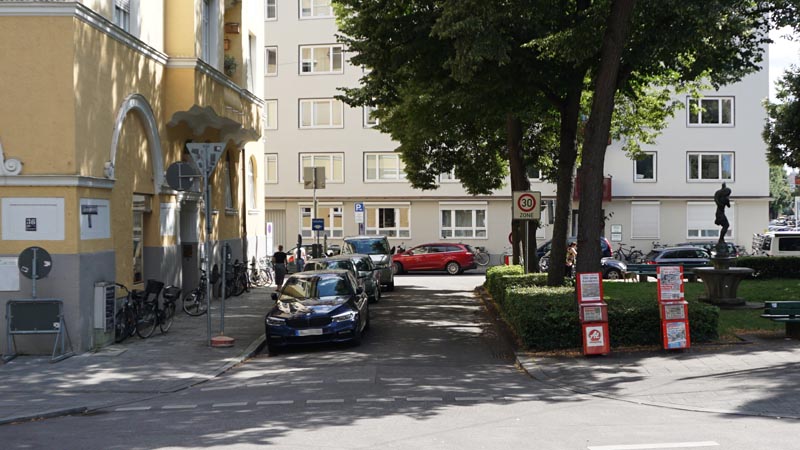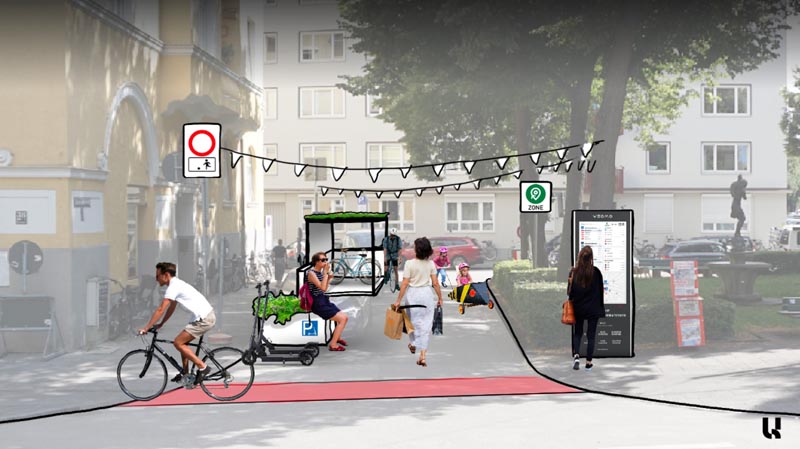Kirstin Hegner worked at Daimler for eight years. She has been Managing Director of the Digital Hub Mobility for the last four years. The hub's goal is to promote projects and innovations in the field of sustainable mobility and to bring together established companies with innovation partners from the start-up scene and science in various formats. As part of the latest Hub project "Umparken", parking spaces in Munich-Schwabing were "cleared" and repurposed.
 Kirsten Hegner
Kirsten Hegner
Just a few years ago, a car was one of the most important status symbols of a German household. Regardless of whether you lived in the city or in the country, you had to have your own mid-range car. In the meantime, the picture has changed fundamentally: For younger people, the car is becoming less and less important. The status object has become a commodity. However, the stock of this "commodity" continues to grow because more and more people in a household can afford their own vehicle: At 47.7 million, the number of passenger cars in Germany has reached an all-time high and exceeded the number of households in Germany (41.5 million). This has consequences: The former darling of the Germans is turning into a burden that is becoming increasingly noticeable, especially in the cities. The car - stationary or moving - takes up too much valuable space.
Kirstin Hegner worked at Daimler for eight years and has two cars of her own: a "practical family car for skiing" and a "small one for the city". The latter is now only used by her sons, because she herself travels 100 per cent by bicycle in the city. She and her team from the Digital Hub Mobility like to try out new apps and mobility offers: "Each of us has about 25 mobility apps - there's still none that can do everything."
For four years now, she has been Managing Director at the Digital Hub Mobility, a division of the non-profit UnternehmerTUM, Europe's largest centre for start-ups and innovation. The Digital Hub Mobility is one of twelve hubs initiated by the Federal Ministry for Economic Affairs and Energy as part of the Germany-wide Digital Hub Initiative.
The goal of the Digital Hub Mobility is to promote projects and innovations in the field of sustainable mobility and to bring together established companies with innovation partners from the start-up scene and science in various formats. Kirstin Hegner: "We want to find answers to the challenges of the future. The problems are so complex that none of the actors can solve them alone. It is about finding new ways and rethinking previous thinking and actions where problems arise. We give impulses on how to shape one's mobility behaviour more sustainably - 'converting' people is not our concern."
 Photo: UnternehmerTUM
Photo: UnternehmerTUM
Is there a way to motivate residents in urban locations to get rid of their cars? This is the question Kirstin Hegner and her team asked themselves in their latest project. The background to this question is a discussion that is currently being held in many cities. Parked cars take up a lot of space in city centres and bring in very little in return. Residents' parking in particular is extremely cheap and does not even cover the costs incurred. At the same time, private cars are used on average just one out of 24 hours a day. It is precisely those cars that are hardly moved that city planners would therefore like to "banish from the city". Kirstin Hegner explains: "Imagine a classic city centre situation. There you have houses to the right and left of the street, then the pavement, next to it the parking bays, a bit of greenery, sometimes cycle paths and in the middle the street. There is simply no space to give the growing number of cyclists and new means of transport the safe space they need. If there were less "stationary traffic", additional space would be created for active mobility and for greenery, bicycle parking, gastronomy or quiet zones. This would make the city as a whole more liveable.
In order to find the right candidates for the "Umparken" project, a search was conducted for people who are open to such an experiment and who do not have an above-average attachment to their private cars. "Car fans with sports cars or similar were not represented in our project. But that was not the plan either. We wanted to find out whether people might be willing to do without a car completely and under what conditions their own vehicle would be dispensable.
The project took place in Munich-Schwabing in the summer of 2020. According to Hegner, it was planned and implemented in a period of four months. "The speed with which we found the necessary partners surprised us. The implementation also went much more quickly than expected because the City of Munich provided energetic support," says the project manager. "This shows very clearly how burning these issues are for cities and municipalities at the moment."
 Photo: UnternehmerTUM
Photo: UnternehmerTUM
 Photo: UnternehmerTUM
Photo: UnternehmerTUM
The team, led by Bernhard Kalkbrenner and Maximilian Ritz, recruited eight households to take part in the urban experiment - all of them parked their cars outside the city for four weeks. The participants received a mobility budget of 300 euros. This was used to pay for all mobility costs - for example for car sharing, public transport, rental bikes, e-scooters or rental cars. The app of the start-up Moovster and a mobility diary made it possible to evaluate the user behaviour of the participants. Hegner explains: "I found it very interesting to see how the budget was used. On average, 220 euros were spent. Most of the distances were covered by public transport and the participants' own bicycles. Only on weekends did people have to resort to other mobility options for trips. It is interesting that almost every car owner significantly underestimates the costs of a car. Often by 50 percent. With purchase costs, petrol, tax, parking fees, etc., it is usually far more than the 300 euros per month that we estimated for our participants. So it pays off financially quite quickly for infrequent drivers to exchange their car for such a bundle of alternatives - including rental cars and taxis - if necessary.
After the parking areas had been "cleared", another component of the project was realised: the conversion of the areas in cooperation with the residents. It very quickly became clear that free spaces gained in the neighbourhood of one's own home do not represent added value for everyone. Kirstin Hegner: "Some were not interested in converting the vacated parking bays. They feared noise or crowds of people outside their own doors." In the end, they agreed on planters (urban gardening) and bicycle parking spaces. "You can't make everyone happy. If politics and/or urban planning change something about the circumstances, they will always come up against different interests," Kirstin Hegner sums up.
At the end of the four-week project period, a balance sheet was drawn up. The unanimous result: on weekdays, not using the car is hardly a problem, as all local destinations can be reached by bicycle or public transport. The situation is more difficult at weekends. For trips with the family, the alternative mobility options do not currently offer an optimal solution in the opinion of the test persons. Trains (before pandemic times, editor's note) are too full, rental offers are either fully booked or perceived as too expensive. "For most, weekend trips were the reason why not using a car would not be an option in the long run. But still: at the end of the experiment, three out of eight households said they would get rid of their car. This means that our urban experiment with a small number of cases confirms the results of comparable large studies. This was a pleasant surprise for us and confirmed the relevance of 're-parking'."
What are actually the conditions that make innovations possible and successful? Kirstin Hegner is certain: "Networks are a key success factor. As the Digital Hub Mobility, we see it as a central task to bring different players together and to link their ideas and potentials. This contributes significantly to strengthening new developments."
This is particularly evident in the area of mobility. The mobility expert explains: "As already mentioned, there is now an enormous variety of mobility offers that can be combined with each other and used to suit every occasion. If I'm on a business trip, for example, I can use an app to organise a rental car, but also a bicycle if I prefer. Or I can get on a bus or train. This range of offers makes it easier to find alternatives to your own car that don't represent a compromise in the respective situation, but are a really good fit." With projects like "Umparken", the Digital Hub Mobility wants to give impulses to activate others to follow or join in. The process of the experiment was published and thus creates the opportunity for others to set up something similar and benefit from the experience gained in it. Kirstin Hegner hopes that as many "Umpark projects" as possible will follow in order to gain further insights and make new mobility concepts a practical experience. "We want to scale the projects. In Munich, a second, larger edition of "Umparken" is now planned and we would be happy if other cities also take up the idea." "If more people join in, it will be even easier to identify the deficits of the current mobility offer in the respective city and develop new offers," says the experienced project manager.
For Kirstin Hegner, mobility budgets, as they can be mapped via the Moovster app, are an important step towards sustainable mobility. A credit is deposited in the app - for example by the employer - which can be spent on any form of mobility. "The mobility budget is already an attractive alternative to the company car for many employees, especially in companies where a job ticket is not possible or sensible (rural areas, editor's note)," Kirstin Hegner is certain.
What trends does Kirstin Hegner see in the field of mobility in the coming years? "Autonomous driving is certainly a very central topic of the future. This will be accompanied by a fundamental change in mobility. Since the transport network is already overloaded, it is essential to avoid empty journeys at all costs. For example, if I drive autonomously to work and discover in the office that my glasses are missing, I could send the car back to get the glasses. Such extra journeys would be disastrous. So linking autonomous driving and sharing or pooling is essential in my view."
For insurance companies, such trends are also of fundamental importance. It is necessary to map completely new models and constellations. In addition, insurers are an essential player for getting involved in projects and pilot studies.
The interview was conducted by Sabine Haas.
Most popular